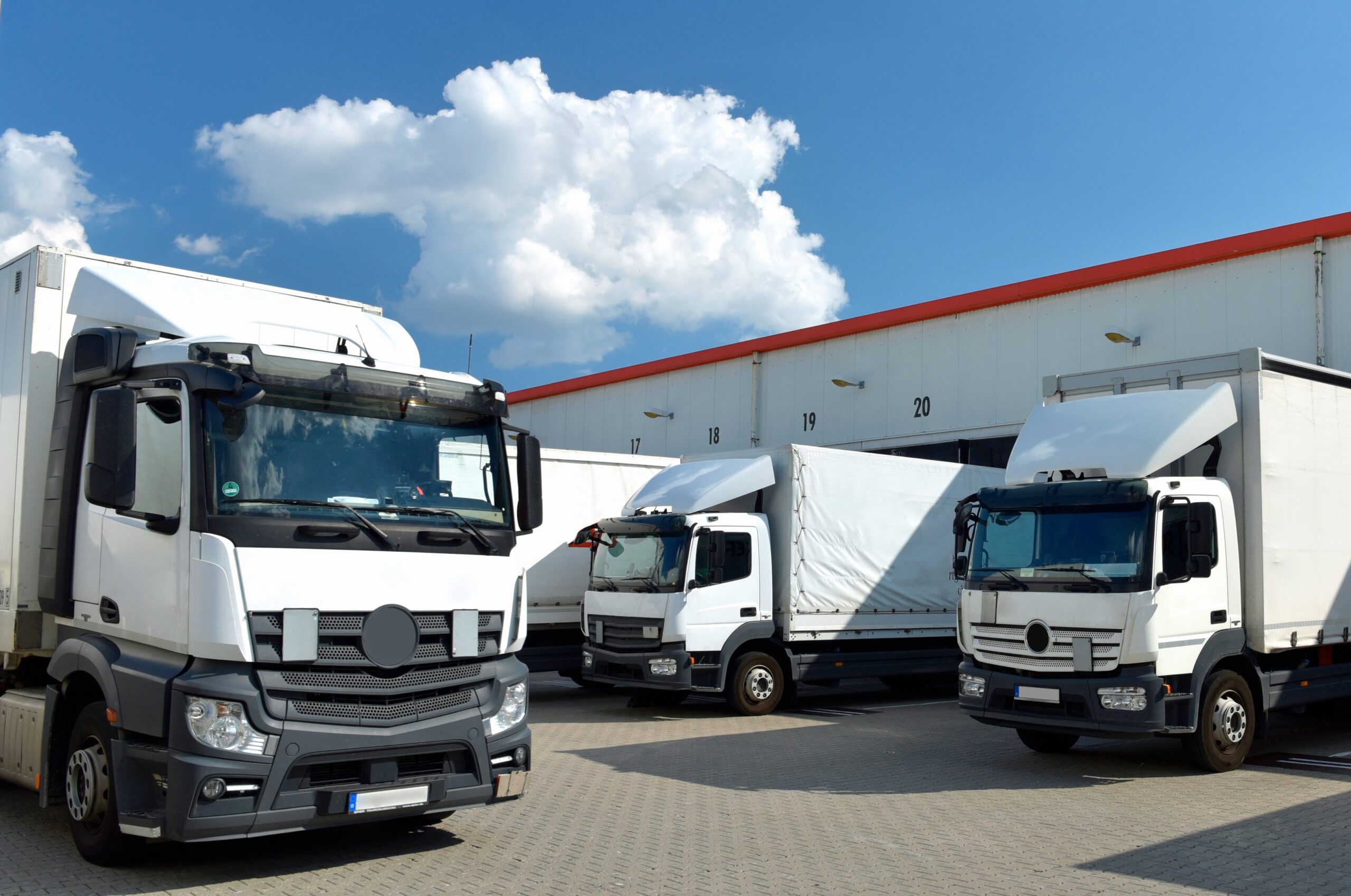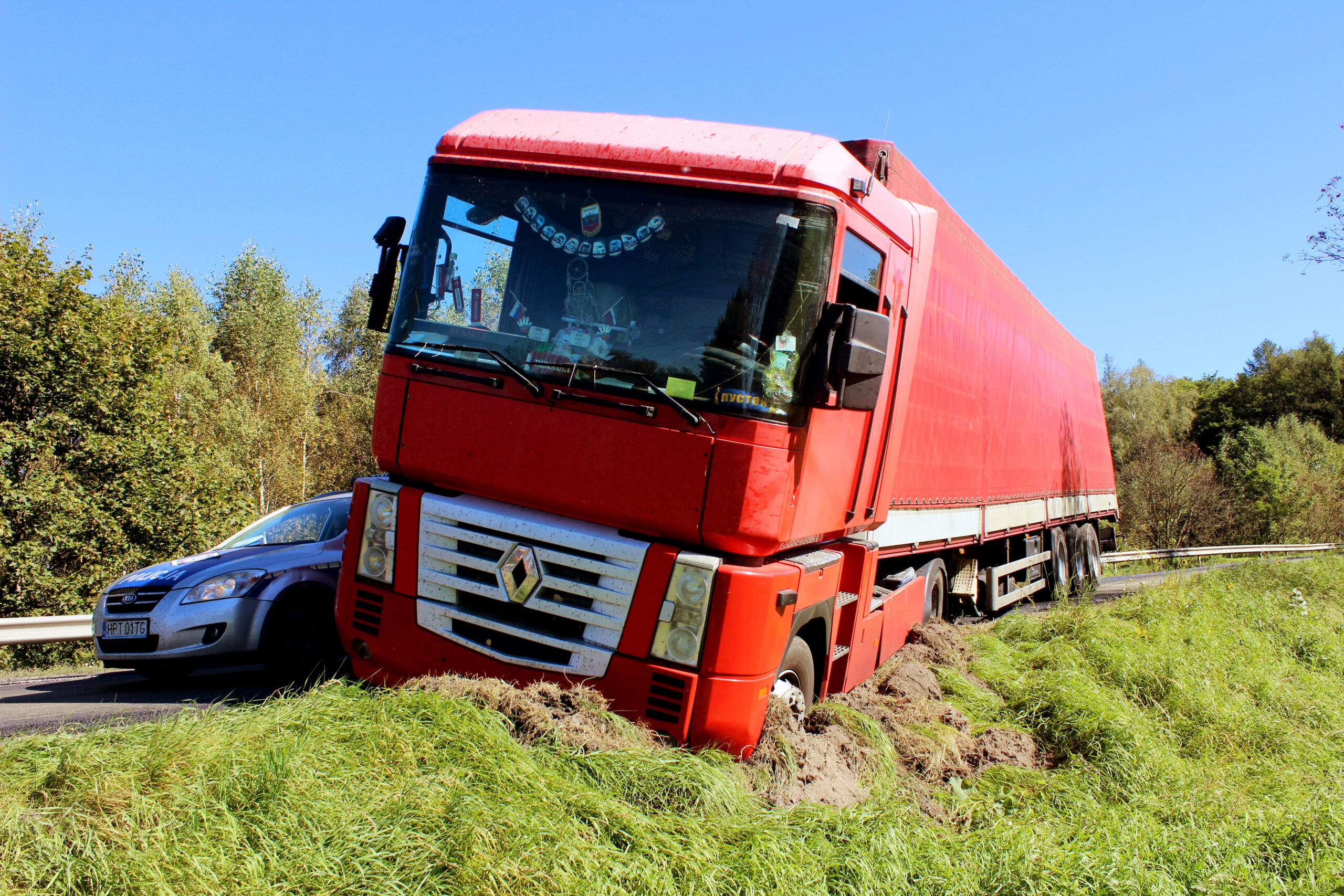Trucks can roll over onto their side when abruptly turning, suddenly changing direction, or hitting an obstacle with one of their wheels. Trucks, large vans, and SUVs are more likely to roll over than other vehicles due to their higher center of gravity.
According to the National Highway Traffic Safety Administration (NHTSA), rollover accidents account for about one-fifth of all fatal traffic crashes on U.S. roads.
Just one wrong maneuver can result in a devastating truck rollover accident. Truck drivers receive training to learn to carefully consider the maneuverability, limitations, and the higher center of gravity of their vehicles when making quick steering maneuvers. The vast majority of rollover accidents involving large trucks occur due to negligence on the part of the trucker.
A truck rollover crash can not only injure the driver of the big rig that rolls over but also other drivers, motorcyclists, bicyclists, and pedestrians around the overturned truck. These accidents tend to cause deaths and disabling injuries.
If you or someone you love suffered injuries in a rollover-related accident, consider contacting an experienced Phoenix truck accident attorney to determine liability and explore your options for compensation.
Causes of Truck Rollovers
According to a study, a tractor-trailer or another big rig is most likely to roll over when the vehicle performs a maneuver that causes the weight of the vehicle or its cargo to shift abruptly.
There are many causes and contributing factors to rollover accidents involving trucks, including:
- Speeding - The risk of a rollover accident increases substantially when a truck driver is speeding or traveling too fast for road or weather conditions. According to the above-mentioned NHTSA report, the propensity to roll over is higher on roads where the posted speed limit is over 55 miles per hour.
- Turning or swerving abruptly - When a truck turns or swerves too quickly to avoid a hazard, the vehicle is likely to roll over onto its side due to a dramatic shift of the truck’s weight or cargo.
- Undergoing sharp and sudden curves - Sharp curves can cause big rigs to roll over because of the sudden shift of the truck’s center of gravity. A rollover accident is likely to occur if the truck driver fails to slow down when undergoing a sharp curve.
- Driving with an overloaded trailer - Federal regulations for cargo loading limits exist for a reason. When the trailer is overloaded, a truck is more likely to roll over because the vehicle is carrying more than it can handle. Driving with an overloaded trailer puts too much stress on the vehicle’s tires and brakes, which may result in tire blowouts and contribute to a rollover.
- Shifting cargo - When cargo in the trailer is not properly loaded, a truck is more likely to roll over due to shifting cargo. The driver of the truck is more likely to lose control of the vehicle and end up in a rollover accident when cargo loads in the trailer are unbalanced or improperly loaded.
- Getting distracted behind the wheel - A truck driver talking on the phone or using his cell phone to send or read a text message is more likely to make bad maneuvering decisions that can cause the truck to roll over.
- Driving while fatigued - Fatigued driving is just as dangerous as distracted driving. A fatigued truck driver may have a slower reaction time and impaired judgment, which can contribute to the likelihood of errors when operating a tractor-trailer or semi-truck.
- Falling asleep behind the wheel - When a driver is too exhausted due to spending too many hours on the road without rest, they are more likely to fall asleep behind the wheel and experience a rollover. Federal hours of service rules aim to prevent fatigue and drowsy driving, but too many truckers ignore those rules and drive more without the required rest periods.
- Driving under the influence of alcohol or drugs - Driving while impaired by alcohol or drugs can impair the intoxicated driver’s judgment, reaction time, motor coordination, and concentration. All of these factors can make it impossible to operate a truck safely. As a result, rollover and other preventable accidents are likely to happen due to the trucker’s intoxication.
- Making unsafe lane changes - Big rigs are likely to experience a rollover when the truck or another vehicle on the road makes an unsafe lane change. Common examples of unsafe lane changes include cutting another vehicle off, failing to signal one’s intention to change lanes, and failing to check blind spots when changing lanes.
- Experiencing mechanical failures - Not all truck rollover accidents occur as a result of driver error. Mechanical failures or defects can also contribute to rollovers. A truck can roll over onto its side when the vehicle experiences problems with the braking or steering system, especially if the tractor-trailer or semi-truck is traveling at high speeds. Mechanical failures can cause a driver to lose control of the vehicle.
- Experiencing low tire pressure - Trucks traveling with low tire pressure can lose road traction and end up in a rollover accident. Problems with the tires can also cause instability when speeding and making turns, which contributes to rollovers.
- Driving in inclement weather - Adverse weather conditions increase the risk of rollovers because drivers are more likely to lose control of the vehicle when driving on wet or slippery surfaces. Fog and rain can also impair visibility, which is why a driver may not notice a curb, pothole, debris, or other hazards on the road that cause them to perform a quick swerving maneuver or hit the obstacle with one of the truck’s wheels.
Rollover accidents can happen for many reasons, ranging from driver error and mechanical failures to bad weather. If you are not sure what caused a truck to roll over in your situation, consider speaking with an experienced lawyer to conduct a thorough investigation and determine what caused your rollover accident.
Can You Sue a Trucking Company for a Truck Rollover Accident?
Many victims of truck accidents mistakenly believe that they cannot hold a trucking company responsible for truck rollovers because thinking that there was no way the company could prevent the accident.
However, trucking regulations aim to prevent or reduce the risk of truck rollovers. Both truck drivers and trucking companies must follow these regulations to ensure everyone’s safety.
You can potentially sue a trucking company if you were injured in a truck rollover accident if your lawyer can prove that the company violated any of the following rules:
- Conducting background checks and checking the qualifications and skills of drivers before hiring them;
- Observing speed limits and setting realistic deadlines for truck drivers to discourage speeding;
- Confirming that truckers comply with the federal hours of service rules, which prohibit truck drivers from driving for more than 11 hours in 14 hours after at least 10 consecutive hours off duty, according to the Federal Motor Carrier Safety Administration (FMCSA);
- Limiting operation of trucks in dangerous conditions (like bad weather that makes it unsafe to drive);
- Installing and maintaining electronic stability control (ESC) systems, which aim to minimize the risk of rollovers;
- Systematically inspecting trucks before every trip and maintaining them in good condition; and
- Following federal regulations for transporting, loading, and securing cargo.
Following these and many other rules can help reduce rollover accidents involving trucks. If a trucking company fails to follow these rules and a truck rolls over, injured victims can hold the company liable for their injuries and losses.
Injuries in Truck Rollover Accidents
In many cases, injuries that motor vehicle occupants suffer in truck rollover accidents are devastating and life-threatening.
Common types of injuries resulting from rollover crashes include:
- Crush injuries
- Traumatic brain injuries
- Loss of a limb
- Paralysis
- Broken bones
- Spinal cord injuries
- Internal injuries and bleeding
Depending on the nature and severity of the injury, victims may have to live with disabilities and might struggle to walk or work for the rest of their lives. When vehicle occupants do not wear a seatbelt, they are more likely to die and suffer catastrophic injuries in truck rollovers. According to the above-mentioned NHTSA report, nearly three-fourths of all vehicle occupants killed in rollovers were not wearing seat belts at the time of the accident.
What Damages Are Available in Truck Rollover Accidents?
When someone suffers injuries in a rollover accident, they can pursue compensation for their monetary and non-monetary damages by filing an insurance claim or lawsuit:
- Economic damages refer to measurable losses incurred by the injured victim. Examples include medical bills, lost wages, out-of-pocket expenses, the cost of vehicle repairs, and others.
- Non-economic damages are intangible losses that are more subjective than economic ones. Examples of non-monetary damages include loss of enjoyment of life, emotional distress, pain and suffering, and others.
You must understand what damages are available in your particular case and estimate the value of your claim when seeking compensation after a truck accident. A lawyer can review your particular situation to assess your damages and determine the settlement amount that will fairly compensate you for all your losses.
Frequently Asked Questions (FAQs) About Rollover Accidents
Do Adverse Weather Conditions Contribute to Truck Rollovers?
Yes, trucks and other vehicles with a higher center of gravity are more likely to roll over in inclement weather. Bad weather conditions that contribute to rollover accidents include sleet, snow, ice, and rain.
Wet or slippery surfaces make it more difficult to control the vehicle, which is why a driver is more likely to make sudden steering and braking maneuvers. In addition to wet and slippery roads, high winds can contribute to rollovers because the wind can cause the driver to lose control of the vehicle.
Who Can Be Liable for Truck Rollover Accidents?
Statistically speaking, rollovers are more likely to cause deaths than other types of truck accidents. For this reason, it is vital to hold all liable parties accountable for their negligent conduct and failure to prevent a rollover.
Liability for a truck rollover depends on the circumstances of the accident. Depending on what caused the crash, the following parties can be responsible:
- The truck driver
- Another driver
- The owner of the vehicle that rolled over
- The trucking company
- The company responsible for shipping or loading cargo
- The company responsible for vehicle maintenance
- Vehicle manufacturers
Negligence is the fault theory that creates the basis of liability in almost all truck accident cases, including those that involve rollovers. Consider speaking with an experienced lawyer to determine liability in your particular case.
What Evidence Do You Need to Prove Fault in a Truck Rollover Accident?
The strength of your case after a truck rollover accident depends on the availability of evidence in your case. If you suffered injuries in a truck rollover, you should gather as much evidence as possible to prove fault and obtain the compensation you deserve.
Valuable pieces of evidence in a rollover accident include:
- The police report
- Photos from the scene of the crash
- Witness testimony
- Videos footage showing the moment of the rollover
- Your medical records
- The truck’s black box data
- The driver’s logbooks
- The vehicle’s maintenance records
- Information about cargo weight and loading
These and other pieces of evidence can be collected during a thorough investigation conducted by a knowledgeable lawyer. Consider contacting an attorney to help you gather all valuable evidence and present your case to the insurance company or the judge or jury in the most convincing manner possible.
Should You Hire a Truck Rollover Lawyer?

While not all truck accident cases require the help of an attorney, those that involve catastrophic injuries, deaths, and/or multiple liable parties do. An experienced lawyer can help an injured victim seek compensation for their damages and losses by conducting a comprehensive investigation, collecting evidence, identifying liable parties, and pursuing a fair settlement amount on behalf of the victim.
A knowledgeable Phoenix truck accident attorney can take swift action to build a strong case, preserve evidence, and protect your legal rights after a truck rollover accident.



